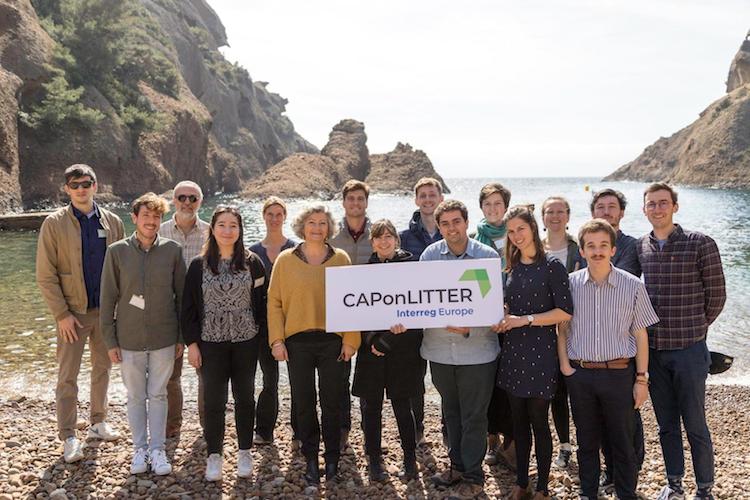
Most of the projects, campaigns and studies we carry out at Rezero focus on Catalunya and the Balearic Islands, where we have our offices. These are coastal territories which both contribute to and suffer the consequences of marine litter generation. Therefore, as an environmental entity that works in coastal areas, this is a phenomenon of great relevance that we cannot ignore, especially since we are in the Mediterranean, a sea that is exposed to a wide variety of human pressures (mass tourism, maritime transport, urbanization of the coast, overfishing) that contribute to the accumulation of marine litter, particularly persistent due to the semi-arid climate and the limited exchanges of the basin’s water bodies.
It is estimated that 80% of marine litter in the Mediterranean comes from land-based sources, especially tourism and leisure activities on the beaches. For this reason, Rezero is working with several public administrations, economic agents and other entities to implement effective measures and policies that prevent the generation of waste on beaches and, therefore, it ending up in the sea.
Rezero has been working on this issue for years and for this reason, at Zero Waste Europe we were invited to attend as experts the first “Interregional Learning Event” of the Cap on Litter project that took place on March 11 and 12 in Marseille, the oldest French city and the most important port in the country and the Mediterranean.
During these two days, the event organizers were able to strike the perfect balance between hands-on learning about the local context and discussion with attendees about preventing marine litter. We had the opportunity to learn more about the Cap on Litter project, the work carried out by the project partners and the experts we attended, as well as other initiatives for the prevention of waste on the beaches within the Marseille region.
Specifically, we learned about the measures implemented by nautical activities to reduce the generation of waste in their facilities and ships, such as, for example, the elimination of disposable plastics in their clients’ meals or the replacement of disposable labels that are stuck on ships by reusable options. It was very interesting to know how the local yacht clubs are already implementing zero waste measures ahead of the 2024 Olympics, as the sailing competition will take place in Marseille.
Some participants were also able to present the tools and methodologies that we use to collect data – through citizen science initiatives such as beach clean-ups and waste characterizations, and to raise public awareness about the impacts of marine litter on their communities. For example, MerTerre has built an online platform, ReMed, which acts as a centralized database to help map the presence of marine debris throughout the Mediterranean region and, at the same time, is a tool to facilitate collaboration and exchange resources between the different participants with the aim of having a collective impact.
In addition, we had the opportunity to learn about the role of restaurants and local organizations in their community to prevent the generation of waste. Located in tourist and coastal areas, these actors are adopting voluntary zero-waste measures, such as the elimination of single-use plastic products from their establishments and the implementation of reusable and compostable solutions. These agents also highlighted the limitations of the legal and regulatory framework that make it difficult to implement other measures, for example, national health legislation. In relation to this topic, there was an interesting presentation by the CPIE Cote Provençale organization on its “Businesses committed to Zero Waste beaches” initiative. This NGO accompanies and contributes resources to local restaurants and shops located near the beach to help them reduce waste generation. It was especially interesting to know how they are using participatory communication tools to change the behaviour of both beach users and business owners.
During the event, we were also able to present the Zero Beach project, co-promoted by Rezero and Eco-union, which aims to promote the application of zero waste strategies on beaches of coastal municipalities. During the summer of 2019, in collaboration with the public administrations of three Catalan municipalities and the Barcelona Metropolitan Area, three pilot tests to reduce waste were temporarily implemented in three metropolitan beaches. The measures that were analyzed consisted of simulating a deposit and return system for beverage containers, a ban on smoking and, finally, raising awareness among beach users about good practices to prevent waste generation and its abandonment on the sand or in the sea. Subsequently, these preventive waste management strategies were legally evaluated to facilitate their implementation in the region.
As for next steps, at Rezero we will continue to support and encourage local administrations and economic agents on the Mediterranean coast to implement effective zero waste strategies. We are looking for new candidates to participate in the Zero Beach campaign and, inspired by the initiatives that were presented during this learning event, we would like to incorporate into this campaign a greater variety of agents who can also play a key role in the prevention of marine litter, such as beach facilities, nautical activities and other sports centres.
Font: Rezero, 2019